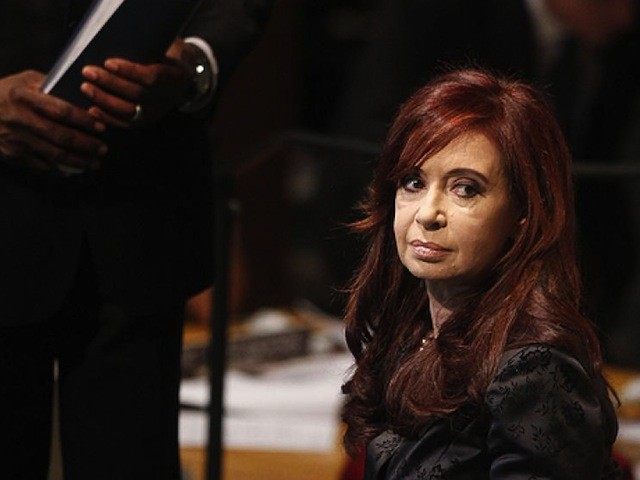A judge in Argentina has ordered the arrest of Cristina Fernández de Kirchner, former leftist president and current senator – contingent upon her losing her legislative immunity – on charges of “treason” for having allegedly aided Iranian terrorists.
Kirchner stands accused of having engaged in a “cover-up” in which she agreed to help the government of Iran protect the organizers of the 1994 bombing of the Argentine-Israeli Mutual Association (AMIA) in exchange for favorable trade deals. Kirchner ultimately signed a “memorandum of understanding” that included Iran as one of the parties heading the investigation into itself. The far-left Kircher government strove to ally itself with Iran and regional rogue states like Venezuela and Bolivia.
Prosecutor Alberto Nisman prepared a report – and arrest warrant – based on evidence of these charges in 2015. The day before appearing in front of Argentina’s congress to represent his detailed report on the AMIA bombing, police found Nisman dead of a gunshot wound to the head. Under Kirchner, investigators ruled the death a “suicide.”
Now, under conservative President Mauricio Macri, those who believe Nisman’s report have hope that they will see Kirchner and her team brought to justice for their alleged ties to Iran.
Judge Claudio Bonadio charged Kirchner with “treason against the nation” and “aggravated concealment” of facts on Thursday in relation to the aftermath of the AMIA bombing. The nearly 500-page indictment against Kirchner accuses her of having “betrayed traditional and historical national interests and those of the people affected by the attacks” by participating in a plan to “gain impunity for Iranian citizens accused in the attack on the AMIA headquarters and to normalize relations between both states.”
The indictment goes on to accuse Kirchner of establishing “parallel, unofficial channels of communication and negotiation” with the Iranians … to advance the planned criminal objective.”
The charge of treason carries a minimum ten-year prison sentence, the Argentine newspaper La Nación notes.
The AMIA bombing was, at the time, the deadliest terrorist attack in the history of the Western Hemisphere, killing 85 people. Prosecutor Alberto Nisman had found evidence tying the perpetrators of the attack to the Iranian government and secured six Interpol “red alerts” against his suspects. A red alert indicates that Interpol has seen sufficient evidence that the individual in question committed a crime that Interpol member countries are compelled to detain them.
In his extensive 2015 report, Nisman alleged that Kirchner and her government had negotiated to urge Interpol to drop the red alerts in exchange for favorable oil deals with the government of Iran. Instead of Iran, Nisman argued, Kirchner had planned to blame “right-wing groups” for the AMIA attack. While Nisman completed the report, he was found dead the night before he was to present it to Congress.
After Nisman’s death, police found a draft arrest warrant for Kirchner. It was in his home and was based on the accusations.
Following Nisman’s death, Kirchner’s officials disparaged him. Kirchner’s chief of staff, Anibal Fernández, told reporters that Nisman’s “licentious lifestyle was very costly,” called him a “scoundrel,” and accused him of cavorting with prostitutes.
Nisman’s death, which Kirchner’s government ruled a “suicide,” became a major issue in the 2015 presidential election. The winner, current President Macri, vowed to undo the “memorandum of understanding” with Iran and launch a credible investigation into Nisman’s death. He invited Nisman’s ex-wife and children as special guests to a presidential debate and has attended events commemorating his life.
To arrest Kirchner, the Argentine Senate would have to strip her of her parliamentary immunity. Clarín, another major Argentine newspaper, expressed skepticism that the Senate would act to have her arrested. For one, as El País notes, the Senate will convene on December 10 and has 180 days to act on the matter. Senators must gather the political will to help the judge pass through his demand before then.
The Senate would then need 48 votes, two-thirds of the vote, to strip her of immunity. Given the precedent of former President Carlos Menem – also a senator, also indicted on criminal charges – Clarín does not see an avenue for the Senate to act to arrest Kirchner.
Judge Bonadio has also called for the arrest of several members of Kirchner’s government who allegedly worked to secure the deal with Iran.

COMMENTS
Please let us know if you're having issues with commenting.